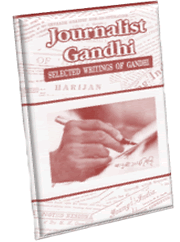
P.O. SEVAGRAM, DIST.WARDHA 442102, MS, INDIA. Phone: 91-7152-284753
FOUNDED BY MAHATMA GANDHI IN 1936
JOURNALIST GANDHI
Selected Writings of Gandhi

JOURNALIST GANDHI
(Selected Writings of Gandhi)
Table of Contents
- ON DEMOCRACY
- ON COMMUNALISM
- ON UNTOUCHABILITY
- ON MORALITY
- ON CASTE
- ON WOMEN
- ON HIS OWN LIFE
- ON RELIGION
- ON SWADESHI
- ON SOCIALIST
- ON CAPITALISM
- ON NON-VIOLENCE
- ON STUDENTS
- ON HIS SON
- ON SOCIAL SERVICE
- ON POLITICS
About This Book
Compiled by : T. K. Somaiya
Gandhi Book Center,
Bombay Sarvodaya Mandal,
299, Tardeo Road,
Nana Chowk, Mumbai 400 007
First Edition : August 1994
Published by : Jitendra T. Desai,
Navajivan Publishing House,
Ahemadabad - 380 014,
India
Printed by : Yash Printers
140/L, Kalbadevi Road,
Mumbai 400 002
India
Download
ON POLITICS
Chapter 30: Two parties
Private and public appeals are being made to me to call all parties together and arrive at a common agreement, and then, they say, we shall get what we want from Great Britain. These good friends forget one central fact. The Congress, which professes to speak for India and wants Unadulterated Independence, cannot strike a common measure of agreement with those who do not. To act otherwise would be to betray its rust. In the nature of things, therefore, there can be no "all parties conference" unless all have a common purpose.
The British government would not ask for a common agreement, if they recognised any one party to be strong enough to take delivery. The Congress, it must be admitted, has not that strength today. It has come to its present position in the face of opposition. If it does not weaken and has enough patience, it will develop sufficient strength to take delivery. It is an illusion created by ourselves that we must come to an agreement with all parties before we can make any progress.
There is only one democratically elected political organization, i.e. the Congress. All the others are self-appointed, or elected on a section basis. The Muslim League is an organization which, like the Congress, is popularly elected. But it is frankly communal and wants to divide India into two parts, one Hindu and the other Muslim. I read an appeal by a Muslim Leaguer suggesting that the British Government should come to terms with the Muslims and depend upon Muslim aid. That would be one way of settling the question but also of perpetuating British rule. The Hindu Mahasabha will no doubt want favoured treatment for Hindus including Hindu States.
Thus, for the present purpose there are only two parties - the Congress and those who side with the Congress, and the parties who do not. Between the two there is no meeting ground without the one or the other surrendering its purpose. The other parties must be presumed to be as constant in their purpose as the Congress claims to be in its. Therefore there is a stalemate. But the stalemate is only apparent. An agreement independently of evolving a common demand the Congress must seek and has always sought. It is the process of conversion. Its nonviolence forbids the Congress from standing aloof and riding the high horse as the opponents say. On the contrary it has to woo all parties, disarm suspicion and create trust in its bona fades. This it can only do when it has cleaned its own stables. The process may take time. That time must be given. It will be no waste. But if the Congress loses hope and faith and comes to the conclusion that it must surrender its original position for the purpose of getting a common measure of agreement, it will cease to be the power it is. Today it is the sheet-anchor of India's hope and faith. It will be well with it, if it refuses to move away from its moorings. Whether it is in a minority or a majority.
Harijan 11-6-1940